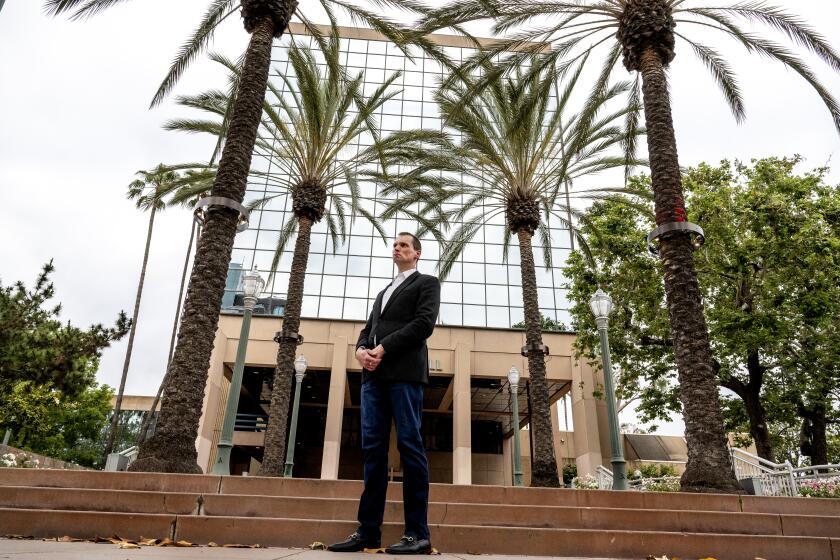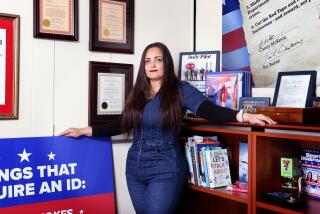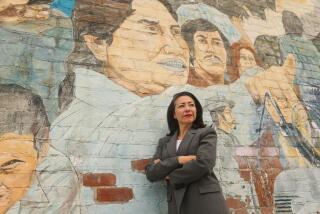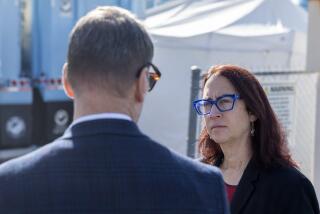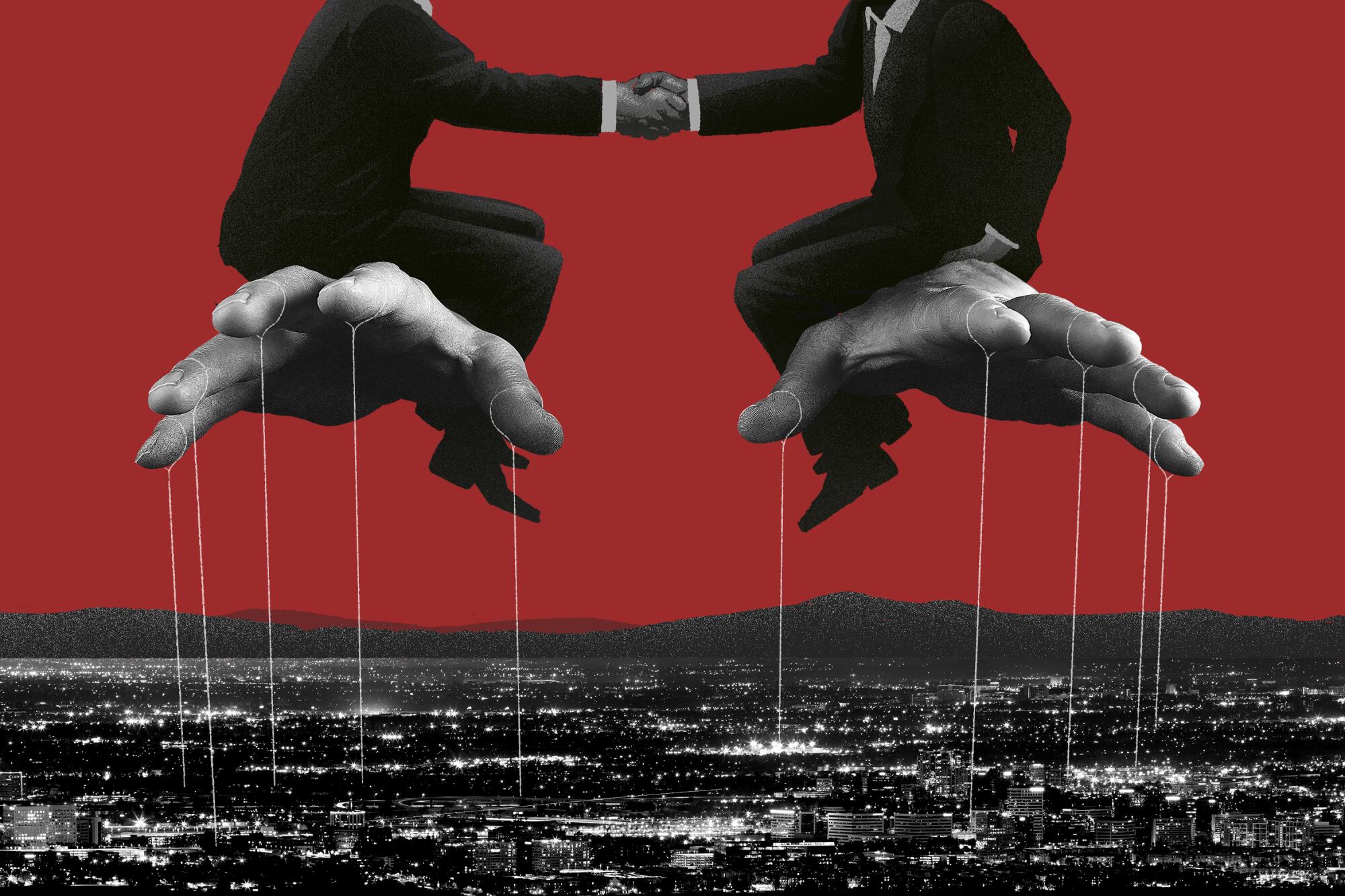
- Share via
As an Anaheim City Council member, Jordan Brandman enjoyed relationships with lobbyists and corporate power brokers that went well beyond cozy.
He was so close to Disneyland’s director of external affairs that they affectionately called each other “twin” and traded messages saying they loved each other. A lobbyist representing the city’s police officers union managed investments for Brandman, more than quadrupling the money he had put in.
Brandman spent his 40th birthday party blowing out the candles at a sushi restaurant, surrounded by friends who often had business before the City Council. And when questions about his mental health emerged, Brandman tried so hard to stay in their good graces that he signed over access to information about his psychological care to a prominent local lobbyist, who was also a friend.
For his part, Brandman voted to give businesses they represented hundreds of millions of dollars in tax breaks, did their bidding by voting to replace a city manager and helped approve lucrative contracts for some of their other clients.
The role of powerful business interests in Anaheim — home to Disneyland Resort and Angel Stadium — has come under renewed scrutiny amid an ongoing federal corruption investigation that became public last year. FBI affidavits detail strong alliances between city leaders and several unelected power brokers, alleging that a covert, self-described “cabal” “wielded significant influence over the inner workings of Anaheim’s Government.”
But just how deep those alliances were wasn’t clear until now.
In a series of interviews with The Times, Brandman provided a rare insider’s look at how the city was run from when he became a council member in 2012 to when he stepped down in disgrace two years ago. His account, along with texts, emails and city records reviewed by The Times, describe relationships that went much deeper than the typical transactional ties that often bind lobbyists and government officials.
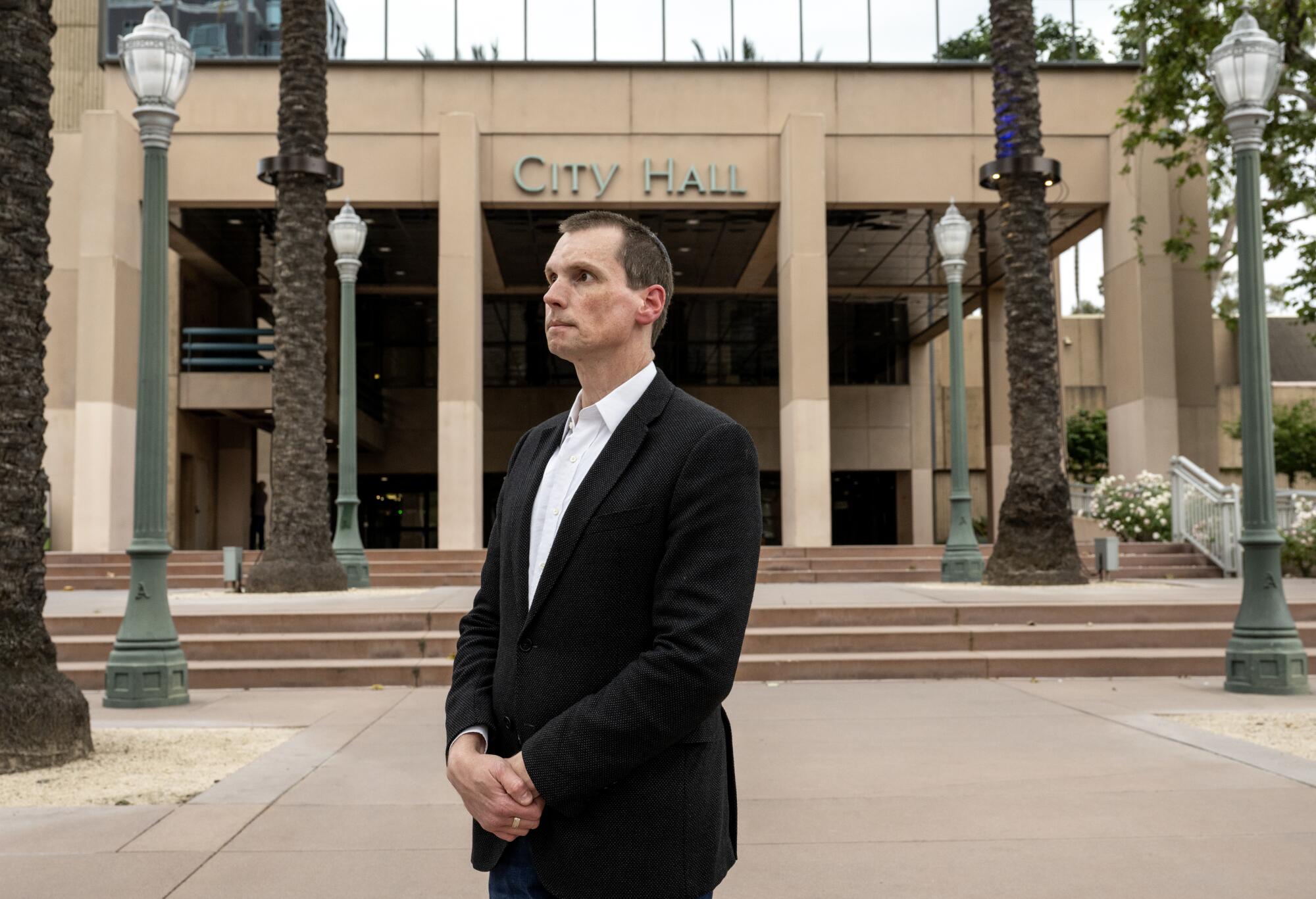
Leaders of the cabal and other city lobbyists were Brandman’s political allies and advisors, the shoulders he cried on. He told them he loved them in text messages reviewed by The Times, and they wrote that they loved him too.
His tenure on the council ended in scandal after violent and misogynistic texts he sent became public. Even then, it wasn’t the electorate or government officials who forced his hand but a group of his onetime friends and allies who met behind closed doors with Brandman to push him to quit.
In 2012, Brandman was a 32-year-old business-friendly Democrat when he was elected to the council on a wave of campaign cash from Disney and other corporate interests, as well as support from construction trade unions.
His election secured a majority on the council that was favorable to tax subsidies for major businesses.
Several months after assuming his seat, he joined other council members in approving a controversial $158-million hotel tax subsidy for the developer of two four-star hotels. The subsidy was championed by the head of the city’s powerful Chamber of Commerce.
The city of Anaheim was aware of one of its then-council members, Jordan Brandman, acting erratically for months before his resignation, and kept his behavior under wraps.
The most dominant establishment in the city, Disneyland Resort, wielded influence through its director of external affairs, Carrie Nocella. Brandman said he met Nocella at a council meeting years before he was elected and the two hit it off.
The pair shared the same March birthday. And months before Brandman’s election, he said, Nocella gave him her father’s Mickey Mouse watch shortly after his death, telling Brandman that her father would have wanted him to have it. (Nocella said in a statement to The Times that her mother gave the watch to Brandman shortly after the death of Nocella’s father, whom she said Brandman knew well.)
After the election, Brandman said he remained close friends with Nocella and another Disney-aligned council member, Kris Murray. He had dinner with Nocella and Murray and their husbands three or four times a week and attended pool parties with them, he said. Nocella and Murray vacationed in Europe together shortly after the councilwoman won reelection in 2014.
“I trusted Kris and Carrie with my life. They were my sisters,” Brandman said.
In 2015, Brandman voted for a deal in which Disney promised to expand its resort, and the city agreed that for the next 45 years, any revenue obtained from taxing Disneyland’s admission tickets would go back to the company. The next year, Brandman was part of the council majority that approved a $267-million tax break for Disneyland’s planned luxury hotel.

Brandman recently defended his votes, saying he used his leverage as the council’s swing vote to successfully push Disney to guarantee union jobs, wages and benefits for construction workers on the planned hotel.
(Disney asked the city to cancel the two tax agreements shortly before a ballot measure approved by city voters required businesses in Anaheim’s resort area receiving such assistance to pay their employees a $15-per-hour minimum wage. The company declined to comment for this story.)
In November 2016, Brandman lost his bid for reelection by 72 votes. He got a new job working for a consulting firm co-owned by a prominent lobbyist who did work in Anaheim.
Brandman’s defeat meant a majority of the City Council now opposed tax subsidies for Disney and other major corporations.
Aiming to restore its influence, Disney spent heavily on the next election. The resort poured more than $1.2 million into a political action committee that supported Brandman and two other candidates in the 2018 council races, helping to elect a new majority of members sympathetic to Disney. The company also backed Harry Sidhu, who was elected mayor.
Sidhu eventually exercised near total authority over decision-making, and unelected power brokers helped manage the mayor and other council members, Brandman said. Among those power brokers, he said, were Todd Ament, then the president of the city’s Chamber of Commerce, and Jeff Flint, a lobbyist who has represented the Angels and Disney and who shared offices with the chamber.
Sign up for This Evening's Big Stories
Catch up on the day with the 7 biggest L.A. Times stories in your inbox every weekday evening.
You may occasionally receive promotional content from the Los Angeles Times.
In a criminal complaint filed last year against Ament, the FBI alleged that he and Flint were “ringleaders of a covert group that appeared to exert significant influence over the City of Anaheim.”
They arranged secret retreats for power brokers and held so much sway that Flint drafted a script for the mayor about a bond measure — with the help of Nocella, whom the FBI described as a cabal ringleader “to some extent.” Nocella mocked Sidhu’s delivery of the script, according to an affidavit filed with the criminal complaint.
“[Sidhu] reads your script so poorly,” Nocella wrote in a text message to Flint reviewed by the FBI.
Sidhu, an alleged member of the cabal, resigned as mayor last year after being accused in another FBI affidavit of a slew of misdeeds in connection with a now-dead deal for the city to sell Angel Stadium, home of Major League Baseball’s Angels, to a company controlled by the team’s owner. Sidhu has not been charged and denied wrongdoing. Ament agreed to plead guilty to four felonies. Flint has denied wrongdoing. The federal documents do not accuse Nocella of criminal wrongdoing, and her attorney said her client is not a target of the investigation.
Sidhu, Flint and Ament declined to comment.
Not every member of the council was viewed as part of the cabal. One of the federal affidavits quotes a wiretapped conversation in which Flint tells Ament that he wants to discuss at an upcoming retreat “how much do we trust” one of the council members, whom the affidavit refers to as “elected official 5.” Brandman said he believed he was “elected official 5” from other details in the affidavit. He said he was not invited to the retreat.
In April 2020, Brandman said, Flint told him during a phone call that he would have to vote to push out then-City Manager Chris Zapata, who was opposing a plan, backed by Ament, to give more money to a tourism program. Flint, Brandman said, told him the vote would decide who was — and who wasn’t — on the “team.”
Brandman said he liked Zapata and they worked well together. But Brandman said opposing the council majority on an important vote like this could result in them ostracizing him and risk his board seat appointment at the Orange County Water District, which was paying him more than $30,000 a year. (He acknowledged he was already earning at least $118,000 consulting for the Building Industry Assn. of Southern California and more than $27,000 as a council member.)
Brandman agreed to cast the vote Flint wanted.
“It’s a vote I’m not proud of,” Brandman said.
Records from an FBI probe show how business interests run the Orange County city home to Disneyland and the Angels.
In addition to his salary, Brandman said he was also profiting from an investment managed by Peter Mitchell, the prominent lobbyist who had hired Brandman after his reelection defeat in 2016. Brandman, who stopped working for Mitchell when he won election again in 2018, said he had pitched in $2,500.
In 2019, Brandman voted in favor of one of Mitchell’s clients, a Shell gas station whose owner wanted to block approval for a proposed Arco station nearby. Public lobbying filings show Mitchell contacted Brandman about the client.
At the time, Brandman denied that his vote on the gas station appeal was a conflict of interest, saying that he vetted the matter with the city attorney. Today, he says he regrets his vote because it created the perception of a conflict. Mitchell did not respond to requests for comment.
Mitchell also represented the city’s police union, and in 2020 Brandman voted in favor of a union contract that granted 14% in raises to rank-and-file officers over six years.
Meanwhile, his investments with Mitchell were performing well. He more than quadrupled his money by the end of 2020 and received $11,000, he told The Times.
He celebrated his windfall with a text to another lobbyist in December 2020: “Also got some great news from Pete that a investment I went in on cashed-in, yay!”
On March 11, 2020, Brandman dined on sushi for a joint birthday party with Nocella, the Disney executive. A video from the event shows the pair blowing out candles on a cake together. In the background were Flint and Ament.
The next day, Disneyland announced it would close due to the spread of the new coronavirus. City Hall followed days later.
Brandman went into isolation in his apartment for months. His physical condition declined, and a thrombosis in his leg, along with a “circulatory deficiency,” was blocking oxygen flow to his brain, he said.
His behavior grew increasingly erratic, which he blamed on his medical condition.
On Dec. 10, 2020, a firm providing his council office with administrative and other services terminated its contract, accusing Brandman in a letter to the city manager of making “comments of a racist and misogynistically charged nature.”
The firm’s owner, Daniel Fierro, said in the letter that one of his employees recently told him that Brandman a year earlier had been “‘ranting and raving’ that he wanted to walk into City Hall and ‘blow people’s heads off’ because they were not complying with his directives, alternately yelling and sobbing.”
Brandman initially told The Times he didn’t recall making a comment about shooting people at City Hall, but it was “something I would have said at the time.” In a later interview, he denied making it, claiming the employee would have reported it earlier. He denied making the misogynistic and racist comments alleged in the letter.
Shortly after the letter was emailed, Brandman said he was awoken by police officers knocking on his apartment door. They told him that friends had been trying to get in contact but hadn’t been able to reach him so were worried.

Subscribers get exclusive access to this story
We’re offering L.A. Times subscribers special access to our best journalism. Thank you for your support.
Explore more Subscriber Exclusive content.
One of them was Todd Priest, another city lobbyist, who had gone to Brandman’s apartment.
Priest told him he knew about Fierro terminating the contract for the administrative help and was worried about him.
Brandman and Priest had been friends for years, Brandman said. And he had previously voted in favor of one of Priest’s clients regarding matters including a transportation contract and a land sale. (Brandman denied that his friendship with Priest had anything to do with his votes.)
A few days after the police visit, Priest and Flint told Brandman on a Zoom call that he needed to take a leave of absence, Brandman said. He agreed, and unofficially took a couple of weeks off.
Brandman signed a medical release granting Priest the right to access information about his psychological care, emails reviewed by The Times show. He said he did so in an effort to show his powerful friends that he was still capable of serving on the council.
“I did just leave a voicemail for” Brandman’s psychologist, Priest wrote in one text, along with three heart emojis.
Physician records Brandman shared with The Times show that a “friend” — Brandman said this was a reference to Priest — suggested he start taking Prozac. In one text, Brandman told Priest he wanted to “touch base” and included a screenshot of his prescription for the antidepressant. In another, he told Priest he had been approved for the medication.
“That’s awesome Jordie!! So proud of you,” Priest wrote back.
Nocella also remained supportive. For their birthday that year, she sent him a Mickey Mouse birthday card, addressing him as “twin.”
“Love you more than U know,” she wrote, drawing a heart.
Disneyland Resort executive Carrie Nocella is one of the unnamed “ringleaders” of a “cabal” that an FBI affidavit says runs Anaheim, according to a source familiar with the FBI inquiry. She is not accused of wrongdoing.
Despite the therapy, Brandman became mired in another crisis after an outburst.
In June 2021, text messages leaked in which Brandman disparaged another council member using crude and sexist language. He called her a derogatory term for women and said he would “rip her f— tits off.”
Some city activists had already begun organizing a recall against Brandman and now ramped up their efforts. The local chapter of the Democratic Party and the Anaheim City Council were planning to hold separate votes on whether to censure Brandman over his comments.
On Aug. 3, Flint called Brandman into a meeting at his office. Attending was a coterie of Anaheim’s power elite. In addition to Priest and Flint, there was Murray, the former council member who was now working as a government affairs and crisis communications consultant; Ernesto Medrano, a construction trades union leader; and Melahat Rafiei, then-California Democratic Party secretary and a political consultant who was working for Brandman. (Rafiei has since agreed to plead guilty to wire fraud in connection with the federal corruption investigation.)
Brandman said they demanded he resign by 5 p.m. the next day. They told him he needed to step down from the council for his own good. Brandman said he left the meeting concerned that if he did not comply, his job with the Building Industry Assn. of Southern California would not be secure.
Notably absent from the meeting was Nocella. The next day, she texted Brandman and informed him that Murray was her “surrogate” and that she would have attended the meeting but was out of town, according to texts reviewed by The Times.
“I’ve been in constant contact with the team. You should know the 5 p.m. date is real,” Nocella wrote. “We are all trying to keep attacks against you at bay. You have a chance to control your own destiny and save your professional career and work on your mental health.”
Brandman asked her to call him, but she said she was on a tour of Texas A&M University.
“Hey babe! I cannot get away from this tour,” Nocella wrote. “Kris [Murray] stands ready to chat as my surrogate: love you.”
Brandman told The Times that as he considered his options, he was reassured by Priest and the former chief executive of the Building Industry Assn. that he would be able to keep his job even if he resigned from the council.
“I love you and thanks for everything you’ve done to help me navigate to a healthier place in my life,” Brandman said in a text to Priest.
He submitted his resignation letter to the Anaheim city clerk the next morning. Blind-copied on the email were Nocella and the attendees of the meeting.
The council majority appointed Gloria Ma’ae, who had been an advisory committee member of a Disneyland-backed advocacy group, in his place.
In a statement to The Times, Nocella said she considered Brandman “a friend and colleague within the Anaheim community,” and she described the group’s meeting with him before he resigned as an intervention by people who were motivated “out of care and concern for his physical and mental well-being.”
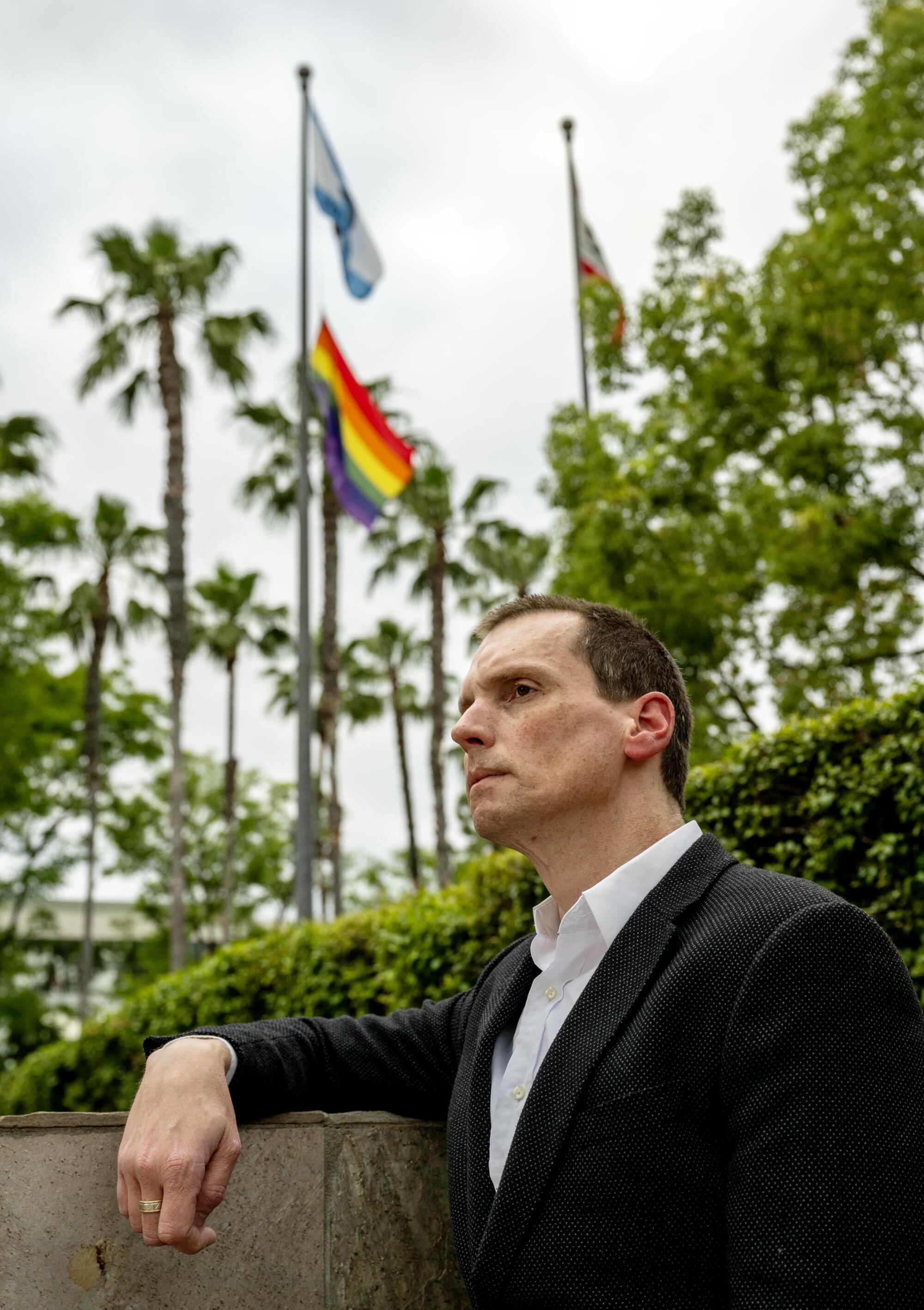
She said she supported their “recommendation for Mr. Brandman to resign from council and focus on recovering and obtaining the medical help he desperately needed.”
Priest declined to answer questions about his relationship with Brandman but gave The Times a statement: “Unfortunately, many of us know friends and loved ones who have experienced challenging times. While I strongly condemn his actions and comments, I am grateful for the support Jordan received from his friends, mental health professionals, law enforcement and others during that time.”
Murray said in her own statement that she attended the meeting with Brandman “for the sole reason of supporting him as a friend and former colleague. At that time, I was very concerned about his physical and mental health. Jordan sent me several texts following that meeting thanking me for my support and friendship.” A day after the meeting, she said, he texted her: “please know I feel at peace because I’m getting healthier and do not want to jeopardize the progress I’ve made.”
Two years on, Brandman expresses regret about a few of his decisions on the council but maintains that most of his actions were in the interests of the city, not the lobbyists he counted as friends. He blamed his downfall not on his own behavior but on the people he said pulled the strings in the city, whom he accused of betraying him.
The ‘cabal’ steered policy, received contracts from the city and scripted remarks by Anaheim’s mayor, a Times investigation found.
“I played by the rules,” Brandman said in a tearful interview with The Times. “And what did they do when I was down, when I was a team player? I’m nothing more than game fowl for the slaughter.”
Asked if he thought the lobbyists controlled his votes, Brandman at first insisted that wasn’t true. But he acknowledged that they had leverage over him at certain points, even influencing some of his medical decisions. He said they exerted tight control over the city behind the scenes.
“It’s a Gilded Age-type of arrangement,” Brandman said, “where the robber barons come and the senators just say yes.”
Brandman remains employed as labor relations director at the Building Industry Assn. of Southern California. He said he cut off communication with the lobbyists after his therapist told him they were a “toxic” influence.
Nocella, occasionally, sends him a text.
On March 10, 2022, the day before their birthday, Nocella texted him a selfie of them together, cheek to cheek with broad smiles on a sunny day. She also sent the video of their party at the sushi restaurant, blowing out the candles together on their birthday cake.
“Two years ago before the [world] and life went to s—. I just want to wish you a happy birthday tomorrow. I love you,” Nocella texted.
Brandman never replied.
More to Read
Sign up for This Evening's Big Stories
Catch up on the day with the 7 biggest L.A. Times stories in your inbox every weekday evening.
You may occasionally receive promotional content from the Los Angeles Times.
